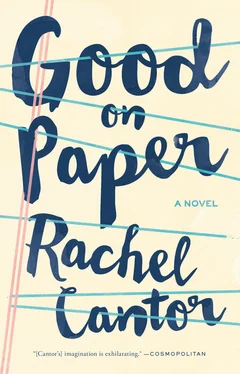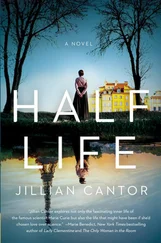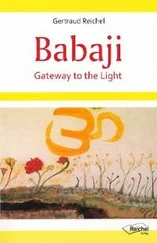Metamorphosis was overrated, I thought. Look at me: forty-four, and the thought of my mother turned me into a weeping seven-year-old. We don’t change. We never change. If some deus ex machina turned me into a tree, I’d still be a tree on the verge of being a seven-year-old.
My father used to say, There’s always door number two.
There’s always another choice to be made. And that choice can change everything.
Maybe.
But I doubt it. He never made that choice, he never changed.
We don’t change, but our lives do, sometimes. That would be enough, I thought — it would be a start, anyway. Because nothing about my life was as it was supposed to be. I’d veered off-track, as Ahmad was quick to point out. When he and I were young, it had seemed so clear. We knew we’d be famous: he as a painter, I as the world’s first writing, dancing architect. Ahmad had become famous — for his theory of “freedom deficits” (when he was still a “Soviet expert,” before coming out cost him his job at the think tank; they blamed the warming of the Cold War, but Ahmad knew). As for me, people often said I had a future, usually before I traded it in for another. My changes of heart had yielded “freedom surpluses,” but little in the way of accomplishment: I’d written stories, translated this and that, contributed, temporarily, to the efficiency of marginal businesses throughout the city. Today I thought, I don’t need to be famous! I don’t even have to have a future! I’d gladly translate pest-management reports or poetry by a fake Romei if it meant I didn’t have to go back to Mr. Ferguson and his proportional-folding system! But shouldn’t I be able to imagine something more?
I couldn’t imagine anything more.
I wrapped myself in Andi’s quilt — a polyester extravaganza sewn by Ahmad’s ex out of the disco shirts of a lover, long dead of AIDS (the guilt quilt , Ahmad called it) — and told life to wake me when it got interesting. I was just nodding off when the phone rang.
Pronto! Pronto! Hello!
A man with a Hollywood pizza-guy accent introduced himself.
It was Romei, or so he said in a passable imitation of Romei’s voice, known to me and everyone in America from his cameo on Seinfeld , where he played a poet who may or may not have stolen Jerry’s cigar (allowing Romei to say, Sometimes a cigar is just a cigar ).
Do you know what time it is? I asked blearily, though in fact it was only seven.
You are Shira Greene, yes? The translator? This is Romei!
I swear he said it with a flourish.
Your joke isn’t funny, whoever you are. Go away, I said, and hung up the phone.
He called again.
Shira Greene, this is only me, or do you say, this is I? Romei? The poet? Perhaps you have heard of me? I am writing Romance Language ? Also Bad Words and Baby Talk .
Not to mention Mother Tongue and Nonsense Syllables , I said, yawning.
You are knowing my work! he said, and sounded pleased — too pleased for an actual Nobel Prize winner.
This isn’t Josh, I said. But Josh put you up to it, right? Tell him I give you an A for persistence, but a C-minus for the lame accent.
I, too, am familiar with your work, the man said as if I hadn’t spoken. I have read this translation of Vita Nuova …
I sat up. Vita Nuova ? Not even Ahmad knew about this. I’d published it years ago as a grad student in a journal read only by dusty Dantisti. I later quit Dante when it became impossible for me to translate his noble love with a straight face. It wasn’t something I talked about, ever .
It is for this reason, the man continued, that I am thinking you also translate my newest book, also entitle Vita Nuova , or maybe Vita Quasi Nuova …
Romei?
It couldn’t be Romei.
I don’t believe it’s you — Romei, I mean.
You think I am something other? he asked, plainly amused.
Quote me something.
You wish me to speak something of my work?
The long poem “Perché Pascal,” I said.
This is a short poem.
Appearing in which volume? I asked.
This Nonsense Syllables you are saying before.
Appearing where?
Is poem forty-seven, also it appear quoted in “Ormai Venerdì,” this is poem fifty-seven.
Freak!
I am saying it to you. And he did — he recited “Perché Pascal,” all two and a half lines of it.
Romei? Was calling me?
You are believing? And you are the translator? The translator from the Italiano?
Of course! It is I. She. It is she! Yes, it’s me!
This is good! This is very good!
He had gotten my number, he said, from Signor Benny at Gilgul —a lit mag that had published some of my stories, may they rest in peace. It wasn’t the first time Benny had acted as mediator: an agent had once “adored” a story he found in Gilgul and wanted to know if I was represented. (Though he wasn’t looking for stories , it turned out, but novels, big, juicy novels , whatever those were.)
Romei’s new work was important, he said. Like Dante in La Vita Nuova , he would use both prose and poetry to tell the tale of a woman — in his case, his wife. Whereas Dante embedded old poems in a narrative about the genesis of those poems, Romei, of course, would write new poems, only new poems. The book would be a gift to Esther.
He wasn’t satisfied with his American publisher’s choice of translator, a big-name poet with too large an ego to be faithful to his, i.e., Romei’s, artistic conception. He’d dumped the publisher, said he’d pay for the translation himself. Now that he, like Dante, was laureato , he had money to burn, apparently.
One question, if you please, he said. You do not think the world is ending? No — how you say— apocalypso ?
Do I think the world will end with Y2K? No, I do not.
This is good. I am speaking with one translator, he say all he do until January is — how you say — have intercourse. This is not for you?
I am available for work, I said
You are familiar with Roma, I think, he said. I am living in Piazza Santa Maria in Trastevere. You are knowing this place, yes?
I laughed. Yes, I was knowing this place. Ahmad and I had spent many an adolescent hour there — gossiping about upperclassmen, plotting the revolution. While my father hunted Archaic Greek statues, and Ahmad’s was a general in the UN’s Green Revolution.
Excellent, he said. Also, you have much respect for the poet. I see this from your story about Paul Celan, though you understand nothing of his work.
Romei had read my story about Paul Celan? No one read my story about Paul Celan!
You read my story about Paul Celan? I said, a tiny tear forming in one eye.
Of course! I must be knowing every thing of your work. I am knowing Celan in Bucharest, yes? Quiet boy. You know, in Dante celan means …
To conceal, I said, wiping the tear with Andi’s guilt quilt. Third-person plural.
You think he is meaning this when he choose this new name?
Names are consequent upon things. That’s what Dante said, right?
You believe this?
I believe that when people change their names, they do so for a reason.
And romei ? he asked slyly. You know what this is mean?
Pilgrims whose destination is Rome, also in Dante. Is that your real name?
What are you thinking?
I adjusted Andi’s Pretty Princess pillow as I pretended to ponder the question, though I knew very well it wasn’t. I’d written a grad school paper on the subject: “The Hystery-Mystery of Romei.”
I think that when you left Romania at the end of the war, you also chose a new name.
Читать дальше












